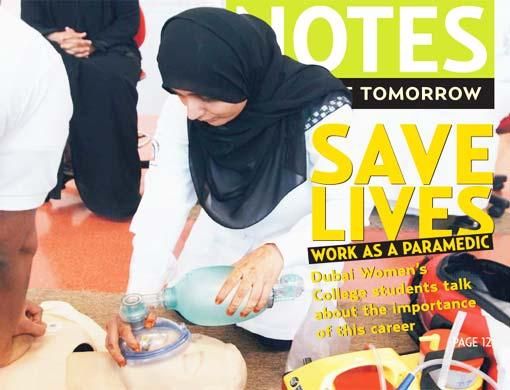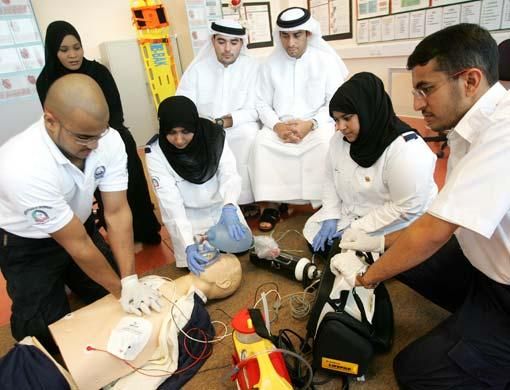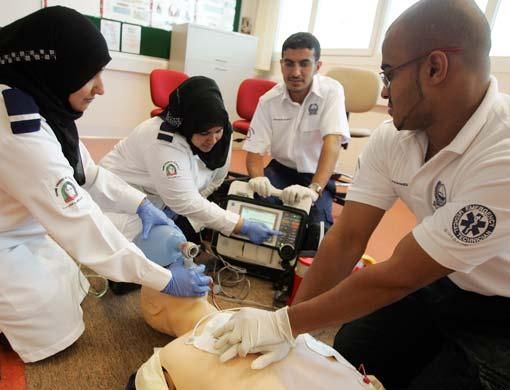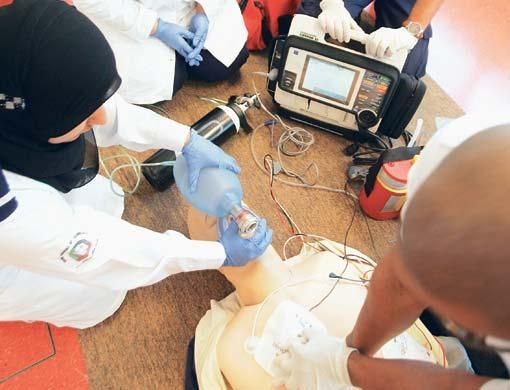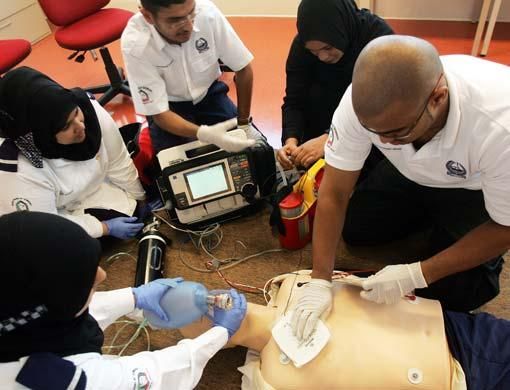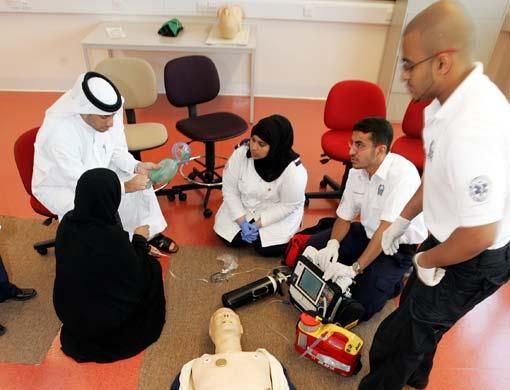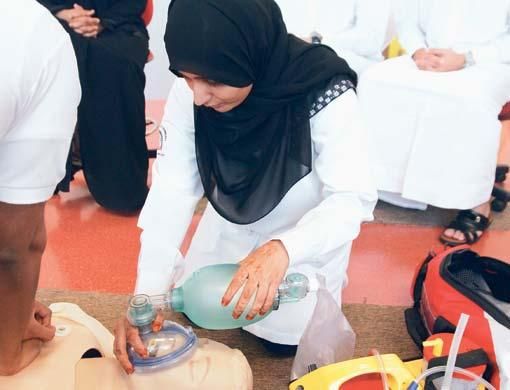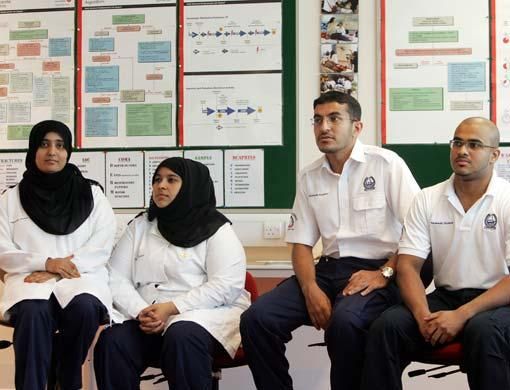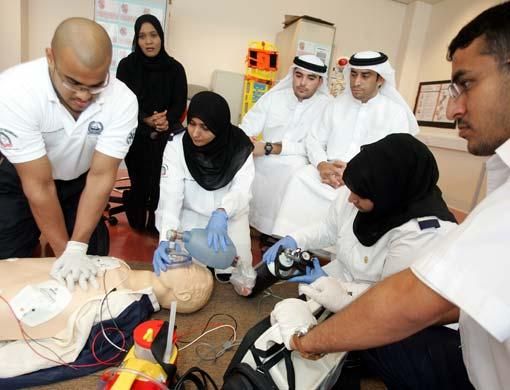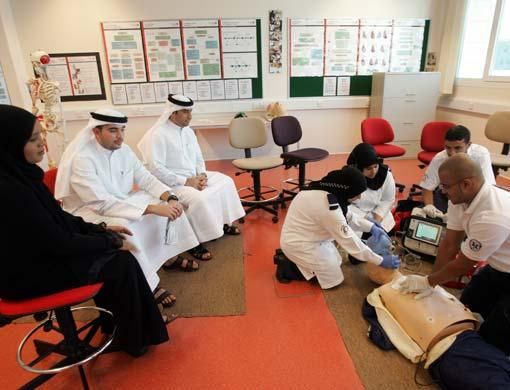Paramedic — a word many of us have heard and have a vague idea about. Who really is a paramedic? Any person who works beside a medical practitioner can be broadly called a paramedic. But in these days of specialisation, a paramedic is a highly trained individual who is usually part of ambulance personnel and is qualified to provide immediate medical care to patients, even those who are critically ill or wounded and have undergone trauma. Paramedics are the first ones to see the patients and give them medical care that can keep their conditions stable till a doctor sees them in a hospital.
Up till now, ambulance personnel in the UAE consisted of paramedics with basic skills and all of them hailed from foreign countries. This year, UAE nationals with advanced life support paramedic qualifications are joining the Dubai Ambulance Services Centre.
The paramedics programme
The Higher Diploma in Paramedics programme is part of the health sciences courses offered by DWC and is the first and only one in the country. The four-year programme, which includes a foundation course, is open to all UAE nationals. It trains paramedics who can provide pre-hospital quality care in emergency trauma and medical situations.
Students undergo extensive training at the basic, intermediate and advanced technical levels of pre-hospital care.
The advanced life support paramedic programme started four years ago in partnership with the Dubai Police, Harrisburg Area Community College, Pennsylvania, USA, and the Dubai Ambulance Service.
The first batch of 14 students passed their EMT (Emergency Medical Technician) examination in June at Harrisburg and are now ready to take up their posts in the UAE. The students spent a month at Harrisburg completing their mandatory advanced life support clinical internship with the West Shore Ambulance Service.
In addition, they completed specialised courses in Paediatric Advanced Life Support (PALS), Advanced Cardiac Life Support (ACLS), and International Trauma Life Support (ITLS).
"When we take up our posts as paramedics in the Dubai Ambulance Services Centre, we will be the first UAE nationals as well as first advanced life support qualified paramedics to serve the people of this country," sais Meshal Julfar, who was among the first batch of graduates this year
Getting into the paramedic programme
As the programme is part of the government initiative to accelerate Emiratisation, UAE nationals who have completed high school and passed General Secondary School Certificate (GSC) or its equivalent are eligible for admission.
The students are also expected to sit for the Common English Proficiency Assessment (CEPA) so that they can be placed in the programme commensurate with their level of academic achievement. If their proficiency in English is good, they can directly get into the Paramedic programme or do a foundation year before starting in earnest with it.
The study programme
There are different levels of Emergency Medical Services (EMS). EMT (Emergency Medical Technician) basic, intermediate and advanced are the levels of qualifications taken by paramedics. HCT students are being prepared for the advanced levels.
Starting with the basics such as medical terminology and first aid, the study programme moves onto advanced diseases, trauma or medical conditions, paediatric, gynaecology, geriatric problems from an emergency medicine prospective.
In the initial year, students learn the necessary subjects such as physiology, anatomy, etc. in the classroom sometimes using dummies as patients. In the advanced years, two out of five days in a week are dedicated to clinical practice either in hospitals or ambulances. For this the students go to Rashid Hospital, Dubai Hospital and the Dubai Ambulance Services Centre. As the programme is dedicated to improving the ambulance services to an advanced level, HCT students get full support from the government.
At the end of the study here, the students spend a full month in Harrisburg to complete the course and appear for their theory and clinical tests.
Studying and testing at Pennsylvania, USA
Students go through gruelling 12-hour schedules that include clinical practice in ambulances. They are exposed to the American EMS system and get to know how the ambulance paramedics carry out procedures.
"We have an affiliation with the State of Pennsylvania Office of EMS and their testing body called the Emergency Health Services Federation, and because our students are registered in an American EMT and paramedic programme, they are allowed to test for the state exams.
"We also have a partnership through the state for testing them. Our students also do courses through the American Heart Association like CPR, advanced cardiac life support etc. They get the opportunity to work with three different ambulance services in Pennsylvania.
"We also have the capability of offering air wing experience through our partnership with Harrisburg. Educationally, I think partnerships are the way to go as the students benefit a lot," said Ronald Blough, Faculty and Programme Coordinator of the paramedic programme.
Thirty-two students are currently pursuing the programme and 20 more are coming up from the foundation course. The 14 graduates are now in the process of being absorbed into the Dubai Ambulance Services Centre.
Career prospects for paramedics
Paramedics can choose to improve or further their career in many ways. They can become teachers of paramedic programmes later in their careers. They can also specialise in critical care and pursue a career in that. Taking into consideration the horrendous traffic snarls in Dubai, paramedics can opt to train to become flight paramedics in a helicopter.
Doing administration jobs in the ambulance services like supervisors, communications staff, etc. is another career choice for paramedics. They can also specialise in purely clinical practice in a trauma centre or they can progress through study and complete a masters' degree in clinical practice.
According to Blough, the paramedic programme at DWC, HCT may move to more cities in the country and the region to include students of other nationalities too.
Abu Dhabi Police is all set to start a similar programme next year.
Graduates speak
Meshal Julfar: "I used to work in the ambulance department and joined this programme to hone my skills as a paramedic. I wanted a higher qualification in what I was doing and this was the best way to do it. I am proud to be part of the first batch of UAE national paramedics with international qualification to function in the country."
Marwan Al Kaabi: "I joined this course straight from high school. I want to help people and I like to work but be on the move. So this programme gave me all I wanted. It is a new job and a new career.
"Moreover I want to change what people think of paramedics as just people who take patients to the hospital from the home or accident site. We are more than that. We can perform advanced procedures including administering drugs and necessary medical treatment to stabilise the patient's condition. A qualified paramedic can perform most of the work done in an Emergency Room (ER)."
Saeeda Buti: "I was a housewife before I started to study to be a paramedic. But now I want to continue my studies as a paramedic or specialise in paediatric advanced life support. There are seven girls including me in the first batch and all of us intend to do this."
Students in the second year of the programme
Asmaa Raheem: "I am looking forward to becoming a paramedic and being the first one to give pre-hospital care to patients. When I pass I will also work in the government ambulance services and in the future for private hospitals."
Laila Khamis: "I joined this programme because I thought it is like nursing, which I was interested to study. But now I am finding this more challenging and interesting.
"We have the best teachers here and they teach us all the different aspects of being a paramedic. We have done some procedures including learning how to use an AED (Automated External Defibrillator) a small portable lifesaving device used if a person suffers a heart attack to analyse the heart rhythm and, if necessary, deliver an electric shock to restore a regular heartbeat."
Yousuf Kayaf: "I know I can make a difference to a patient by being a trained and qualified paramedic. I believe I can serve humanity better by being in this profession."
Moslem Hussain: "Right from a young age, whenever I saw an ambulance moving on the road I dreamt of being in it and save people's lives. That is why I joined this programme. With my advanced skills and knowledge I want to help patients who go to hospital on a stretcher to walk out of there healthy. "
Paramedic Programme
Basic first aid tips
What do we do when faced with an emergency situation where a person is wounded, has a heart attack or an asthma attack?
Sharon Young, faculty for DWC Paramedic Programme, said:
- In a trauma situation like an accident it is very important not to move the patient unless it is absolutely necessary in situations like the car is on fire or the patient is in danger of being hit by other moving vehicles. Moving the patient might aggravate injuries to the spine and result in complete paralysis of the limbs.
- If the patient is bleeding from any part of the body, the best thing to do is to find a clean cloth or towel and place it firmly on the wound and hold it down applying pressure on the spot where it is bleeding to make it stop.
- In a medical emergency like a heart attack the best thing to do is to make the patient lie in a comfortable position. If the patient is conscious the patient should be in a reclining position with the upper body propped up by pillows. Keep the patient warm, don't give any fluids and reassure him/her while you call in the paramedics. If patient is on medication already, place the prescribed tablet under his/her tongue.
- If the patient is unconscious, it is best to get the patient in a recovery position – patient is lying on his/her side, the chin is well up to keep the epiglottis opened and the mouth is downward so that any fluids like vomit or blood can drain from the patient, top knee is placed slightly higher and arms and legs are locked as to stabilise the position of the patient.
- In case of an asthmatic attack, a patient should be kept in an upright position and encouraged to breathe slowly and deeply. Give any medication if the patient has it with him/her. Make sure the patient gets plenty of fresh air and loosen any tight clothing he/she might be wearing.
Do you know what to do when faced with a medical emergency?
Compiled by Manal Ismail
"I'd try to find out what caused the injury, and if I can help, then I will."
— Mehran Jawadi, chemical engineering, American University of Sharjah (AUS)
"No, I wouldn't know what to do because I've never been given formal lessons."
— Heydar Shirazi, civil engineering, AUS
"I know what to do from personal experience of having to help others when they're injured."
— Ahmad Al Boghdady, computer engineering, AUS
"If someone drowned I would be able to perform CPR. It's something I taught myself because it is very important to know."
— Hani Abu Eleish, computer engineering, AUS
"I've never been taught what to do in such situations, but I think I would know the basics through common sense."
— Feras Abu Khalid, civil engineering, AUS
"I know what to do in situations like a fire or an earthquake, but not in severe medical emergencies."
— Ashraf Ebrahim, computer engineering, AUS
"If someone was choking, I'd know how to perform the Heimlich manoeuvre. That's about it."
— Mohammad Jhonima, mechanical engineering, AUS
"If someone was injured and I didn't know what to do, I would run to get help, but in an orderly manner."
— Abdul Aziz Bin Kalban, civil engineering, AUS
"If someone was bleeding I'd quickly put pressure on the wound to stop the bleeding. I took basic lessons on these things in school."
— Munrir Badr, civil engineering, AUS
"All that I know is what I've seen in the media. If someone was severely hurt, I'd try to take them to the nearest hospital."
— Mohammad Taleb, mechanical engineering, AUS
"I've seen how to handle these things on TV and movies, but the first thing I would do is call for help from a professional."
— Mohammad Hafez, mechanical engineering, AUS
"I took a first aid course so I do know a couple of things on how to help someone in a medical emergency."
— Shariq Jalal, mechanical engineering, AUS
Have your say
Do we have enough qualified paramedics in the UAE? How important is their role? Should there be more programmes to help people qualify for it? Do you know someone whose life was saved by a paramedic?Write to us at
education@gulfnews.com


